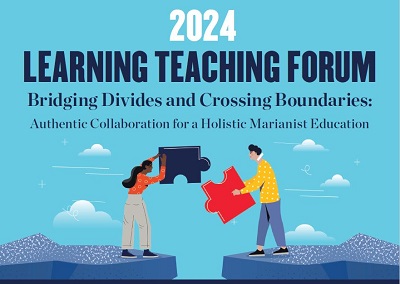About the Presenter(s)
Gerica Brown, Assistant Dean for Inclusive Excellence Strategic Initiatives, School of Engineering Ione Damasco, Interim Dean, Associate Dean for Inclusive Excellence and Organizational Development, Professor, University Libraries Justin Keen, Director of Assessment and Student-Centered Analytics, Academic Affairs and Learning Initiatives Leslie Picca, Roesch Chair in the Social Sciences, Professor of Sociology, College of Arts and Sciences Nancy McHugh, Executive Director of the Fitz Center for Leadership in Community, Professor of Philosophy, College of Arts and Sciences
Location
Kennedy Union Room 310
Start Date
3-1-2024 2:20 PM
End Date
3-1-2024 3:10 PM
Abstract/Description
As the University of Dayton seeks to distinguish itself through curricular innovation and creating a holistic, integrated and relationship rich learning environment for our students it is evident that doing so with an equitable mind frame is the secret sauce for success. Engaging all students in a meaningful and holistic learning experience where all students participate in rich development opportunities and persist to graduation at higher rates requires a deeper understanding of the why. (ex. Why are some students not engaging? Why do some students fall through the cracks? Why are some students unsatisfied with their University of Dayton experience?) Only through an equitable mind frame can we achieve a collective, deep and complex understanding of why and build greater capacity to develop solutions which address the root causes and lead to greater and more equitable outcomes.
Creating an equitable culture which develops effective solutions and yields greater outcomes requires an intentional immersion in one's own development as an equity-minded practitioner. This developmental journey is relevant to all institutional agents including all administrators, leaders, faculty, and staff who are the gatekeepers of the systems and processes which govern the student-centered operations of the institution. The book From Equity Talk to Equity Walk by Tia Brown McNair, Estela Mara Bensimon, and Lindsey E. Malcom-Piqueux is the framework by which this workshop will engage attendees in an interactive discussion.
Goals for Attendees
-Introduce the principles of racial equity -Discuss structural obstacles that impede equitable progress -Create a shared understanding of the complexities of developing an equitable mindset -Identify specific actions that individuals can take in their journey toward equity-mindedness These goals connect to the theme of: Exploring sustainable professional learning opportunities that support the ongoing development of campus leaders across academic and co-curricular units and offices. By engaging attendees in dialogue and personal reflection around equity-mindedness and equitable student outcomes we are modeling an approach to sustainable professional learning. This can lead to transformational mindset shifts which can positively impact outcomes for students now and in the future.
Creating Shared Equity Leadership: How a Culture of Equity-Mindedness Transforms Institutional Capacity toward Greater Collective Outcomes
Kennedy Union Room 310
As the University of Dayton seeks to distinguish itself through curricular innovation and creating a holistic, integrated and relationship rich learning environment for our students it is evident that doing so with an equitable mind frame is the secret sauce for success. Engaging all students in a meaningful and holistic learning experience where all students participate in rich development opportunities and persist to graduation at higher rates requires a deeper understanding of the why. (ex. Why are some students not engaging? Why do some students fall through the cracks? Why are some students unsatisfied with their University of Dayton experience?) Only through an equitable mind frame can we achieve a collective, deep and complex understanding of why and build greater capacity to develop solutions which address the root causes and lead to greater and more equitable outcomes.
Creating an equitable culture which develops effective solutions and yields greater outcomes requires an intentional immersion in one's own development as an equity-minded practitioner. This developmental journey is relevant to all institutional agents including all administrators, leaders, faculty, and staff who are the gatekeepers of the systems and processes which govern the student-centered operations of the institution. The book From Equity Talk to Equity Walk by Tia Brown McNair, Estela Mara Bensimon, and Lindsey E. Malcom-Piqueux is the framework by which this workshop will engage attendees in an interactive discussion.



